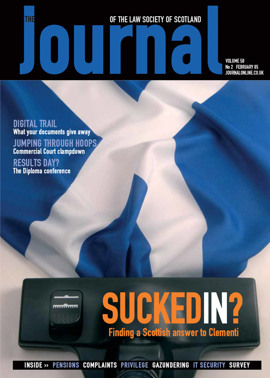Bank on it

The decision of the House of Lords in the case of Three Rivers District Council v Governor and Company of the Bank of England [2004] UKHL 48; [2004] 3 WLR 1274 considered the issue of legal professional privilege, in particular the policy justification for its existence and its permissible scope. Although the decision arises from a civil action, its rationale and scope have a general application, with implications for legal advisers in all areas of the law, particularly those involved in public and other inquiries.
Flowing from a liquidation
The action had its roots in the collapse of BCCI. The Bank of England (“the Bank”) has a supervisory role in relation to banks and financial institutions carrying on business in the UK. It therefore had statutory responsibilities regarding the supervision of BCCI.
Shortly after the collapse of BCCI it was announced that there would be an independent inquiry into the Bank’s supervision of BCCI under Bingham LJ. Given the terms of his reference it was apparent that the principal party to be investigated was the Bank. It set up a unit to deal with the inquiry (the “Bingham Inquiry Unit” or “the BIU”). It also appointed the English firm of Freshfields to give legal advice as to the preparation and presentation of the Bank’s evidence to the inquiry.
The inquiry report was published on 22 October 1992. In 1993 an action was raised by a number of depositors with the UK branches of BCCI, and BCCI itself (by its liquidators), against the Bank for losses caused by the collapse. Under the Banking Act 1987, section 1(4) it was necessary for the plaintiffs to establish not merely that the Bank had been negligent in its supervisory duties, but that its various acts and/or omissions to which the collapse was alleged to be attributable had been in “bad faith”.
Given the very high test the plaintiffs had to overcome, they were naturally keen to recover as much documentation as they could. An initial discovery process reached the Court of Appeal, which ordered disclosure: [2003] QB 1556. It held that the only documents which the Bank was entitled to withhold were communications between the Bank and its solicitors “for the purpose of seeking or obtaining ‘legal advice’”.
The Bank petitioned for leave to appeal but this was refused. It thereafter proceeded to disclose documents whose disclosure was required. The Bank however disclosed none of the communications between the BIU and Freshfields, or drafts of or internal memoranda relating to the overarching statement that had been submitted on its behalf to the inquiry. The Bank contended inter alia that the expression “legal advice” in the Court of Appeal’s decision should be interpreted widely so as to cover all advice and assistance from Freshfields or counsel relating to the evidence to be submitted to the inquiry on behalf of the Bank, i.e. so as to cover advice given for presentational purposes.
Further proceedings for disclosure followed. The Bank was unsuccessful both at first instance and on appeal, the Court of Appeal holding that for legal advice purposes the advice being sought must be in relation to the Bank’s “rights and obligations”: [2004] QB 916. Advice as to how the Bank should present its case did not qualify for privilege. The Bank appealed to the House of Lords.
Downstream to the Lords
Policy considerations of legal advice privilege
Their Lordships considered the policy reasons underlying the legal advice privilege. They recognised that there were two categories of legal professional privilege: legal advice privilege and litigation privilege. The appeal related to the former category.
The House agreed on the general principle that “If the advice to be given by lawyers is to be sound, their clients must make them aware of all the relevant circumstances of the problem. Clients will be reluctant to do so, however, unless they can be sure that what they say about any potentially damaging or embarrassing circumstances will not be revealed later” (per Lord Rodger at [54]).
Although their Lordships accepted that this policy meant that a court or tribunal might be deprived of potentially useful evidence, the public interest that people be properly advised on matters of law outweighed the competing public interest of making that evidence available. As was said by Lord Nicholls of Birkenhead in Re L [1997] AC 16 at 32: “The public interest in a party being able to obtain informed legal advice in confidence prevails over the public interest in all relevant material being available to the courts when deciding cases.”
Scope of legal advice privilege
Their Lordships took the view that legal advice privilege should be given a scope that reflected these policy considerations. In allowing the appeal, all five Lords endorsed the judgment of Taylor LJ in the case Balabel v Air-India [1988] Ch 317 at page 330 in which he stated: “legal advice is not confined to telling the client the law; it must include advice as to what should prudently and sensibly be done in the relevant legal context”.
He went on to say: “to extend the privilege without limit to all solicitor and client communication upon matters within the ordinary business of a solicitor and referable to that relationship [would be] too wide”.
Lord Scott of Foscote agreed, holding that “a relevant legal context” was essential, drawing a distinction in the case where a solicitor acted as the client’s “man of business” and gave advice on, for example, investment and finance policy. Such cases lacked a legal context. However he was of the view that “legal context” included advice in relation to rights, liabilities, obligations and remedies under either private or public law (at [38]).
In his view when assessing whether communications should attract legal privilege, a judge should essentially apply a three part test:
- (1) Is there a relevant “legal context”?
- (2) If yes, does the legal advice relate to rights, liabilities, obligations or remedies of the client?
- (3) If so, is (a) the occasion on which the communication takes place, and (b) the purpose for which it takes place, such as to make it reasonable to expect privilege to apply?
The criterion to be applied was an objective one.
In applying this test to the present case Lord Scott had no difficulty in finding that it fell squarely within the policy considerations underlying legal advice privilege. He reasoned that the preparation of evidence and submissions to be made to the inquiry was for the purpose of enhancing the Bank’s prospects of persuading the inquiry that it had discharged its public law obligations. The presentational advice given by Freshfields was advice “as to what could prudently and sensibly be done in the relevant legal context”. That context in his view was the Bingham Inquiry and the question of whether the Bank had discharged its public law duties under the Banking Acts.
The other Lords agreed with Lord Scott. Lord Rodger in particular took the view that the Banking Acts formed the relevant legal context in this situation. The Bank had instructed Freshfields to carry out a function that necessarily involved the use of their legal skills and the communications were therefore privileged.
The House was agreed that presentational advice within a relevant legal context attracted legal advice privilege.
This decision represents emphatic support for the common law position on legal advice privilege. Such privilege would seem now to be too well established to be called into question and is certainly not to be restricted to the litigation context or to communications relating solely to a client’s rights and liabilities. Lawyers and clients alike can remain confident that legal advice given in a legal context and involving the exercise of the skills of a lawyer will continue to be privileged.
James Lloyd is the litigation partner heading the Insolvency Practice Group at Harper Macleod LLP
In this issue
- Sell or transfer? (1)
- Promoting competition or competitiveness?
- Promoting competitiveness or competition?
- Not the final word
- Challenge of the FSA
- The pull of the south
- A world of change
- Finding the path
- An elusive model?
- Bank on it
- Trouble at t'mill
- Hidden evidence
- Money claims on behalf of children
- Secure connections
- Tread carefully
- Sell or transfer?
- Cracking the conflict code
- X Factor for success?
- Scottish Solicitors' Discipline Tribunal
- Website reviews
- Book reviews
- Is "gazundering" always bad?
- Defining the guideline






